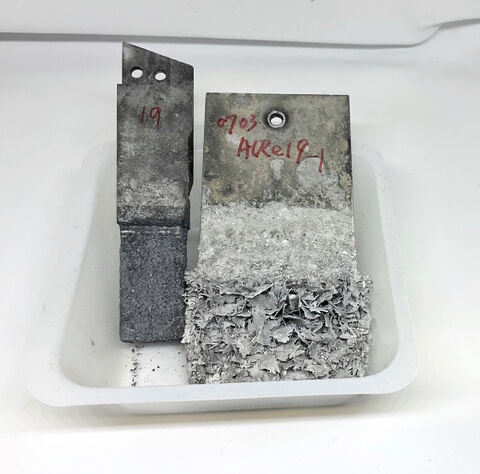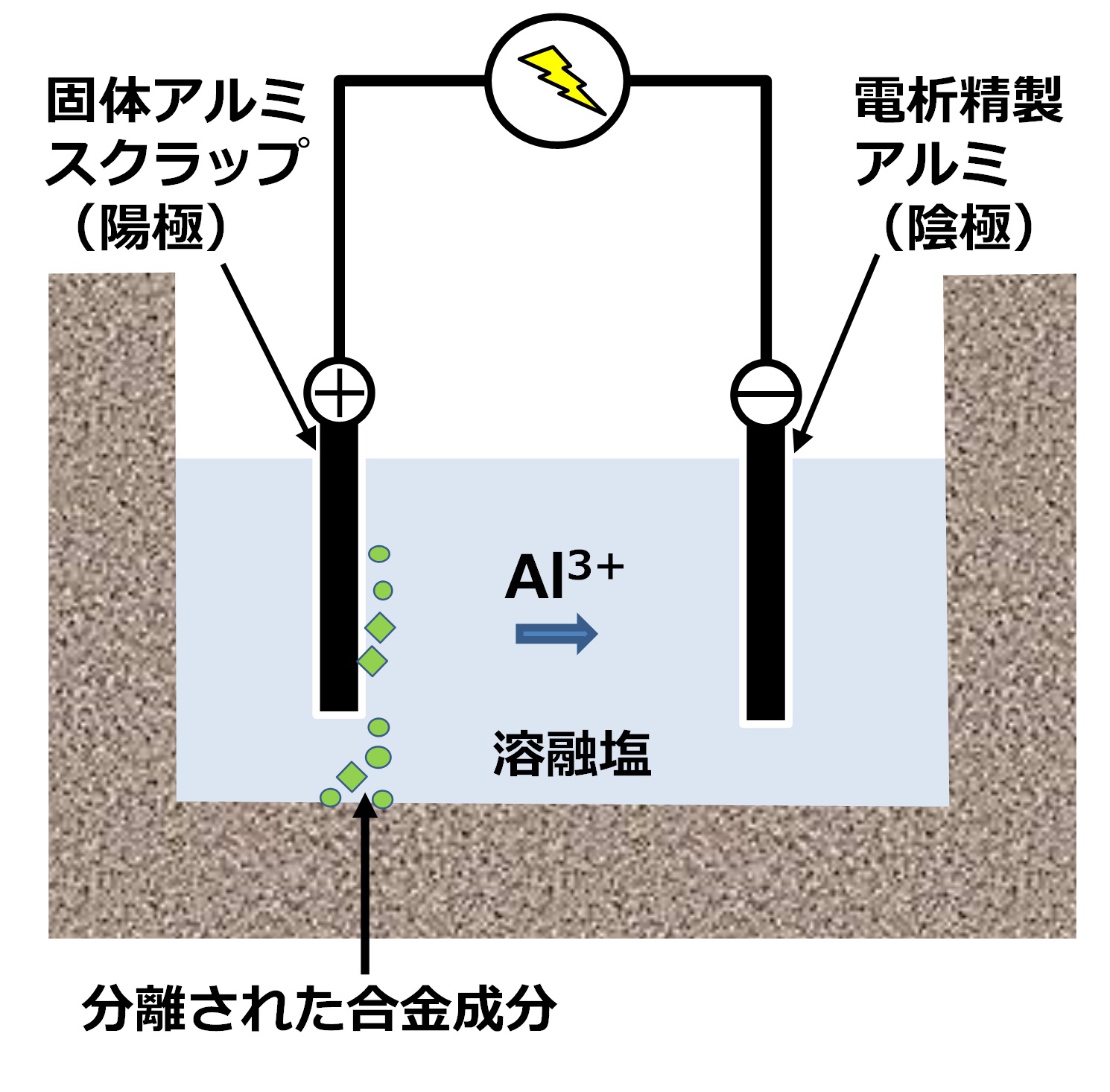

Tohoku University: Recycle aluminum with high purity:
-Tohoku University Group develops refining technology-
Tohoku University
Graduate School of Engineering
April 26
The research group
“Regenerate aluminum waste material mixed with impurities” into high-purity aluminum
Developed a new refining technology.
Regenerated into high-purity aluminum:
By “improving quality from before reuse”, we can contribute to the new circulation of aluminum.
We aim to develop practical technology in the next 5 years.
The results were published in the English scientific journal Nature on April 14.
99.9% purity:
The research group
We have constructed a “method of electrolyzing a cast material containing impurities without melting it as a solid”.
Soak in alkaline chloride at 500 degrees for 5 hours,
Separated from alloying elements such as silicon
10 g was purified with a purity of 99.9%.
Applications for new technologies:
With the spread of EVs, the demand for engines will drop sharply.
By 2040, 3.6 million tonnes will be unnecessary worldwide.
There is concern about the “aluminum crisis” in which the recycling structure collapses.
Compared to the process of making refined aluminum from new metal
Energy consumption can be reduced to less than half.
The environmental load is reduced.
Kahoku Shimpo: ONLINE NEWS
https://kahoku.news/articles/20220426khn000045.html
Université du Tohoku : Recycler l’aluminium à haute pureté :
-Tohoku University Group développe une technologie de raffinage-
Université du Tohoku
Ecole Supérieure d’Ingénieurs26 avril
Le groupe de recherche
“Régénérer les déchets d’aluminium mélangés à des impuretés” en aluminium de haute pureté
Développement d’une nouvelle technologie de raffinage.
Régénéré en aluminium de haute pureté :
En “améliorant la qualité avant réutilisation”, nous pouvons contribuer à la nouvelle circulation de l’aluminium.
Nous visons à développer une technologie pratique dans les 5 prochaines années.
Les résultats ont été publiés dans la revue scientifique anglaise Nature le 14 avril.
Pureté à 99,9 % :
Le groupe de recherche
Nous avons construit une “méthode d’électrolyse d’un matériau coulé contenant des impuretés sans le faire fondre sous forme solide”.
Faire tremper dans du chlorure alcalin à 500 degrés pendant 5 heures,
Séparé des éléments d’alliage tels que le silicium
10 g ont été purifiés avec une pureté de 99,9 %.
Applications aux nouvelles technologies :Avec la diffusion des véhicules électriques, la demande de moteurs va fortement chuter.
D’ici 2040, 3,6 millions de tonnes seront inutiles dans le monde.
On s’inquiète de la «crise de l’aluminium» dans laquelle la structure de recyclage s’effondre.Par rapport au processus de fabrication d’aluminium raffiné à partir de nouveau métal
La consommation d’énergie peut être réduite de moitié.
La charge environnementale est réduite.Kahoku Shimpo : NOUVELLES EN LIGNE
Universität Tohoku: Recyceln Sie Aluminium mit hoher Reinheit:
-Tohoku University Group entwickelt Raffinationstechnologie-
Tohoku-Universität
Graduiertenschule für Ingenieurwissenschaften26. April
Die Forschungsgruppe
„Regenerieren Sie mit Verunreinigungen vermischte Aluminiumabfälle“ zu hochreinem Aluminium
Entwickelte eine neue Raffinationstechnologie.
Zu hochreinem Aluminium regeneriert:
Durch die „Verbesserung der Qualität vor der Wiederverwendung“ können wir zur neuen Zirkulation von Aluminium beitragen.
Unser Ziel ist es, in den nächsten 5 Jahren praktische Technologie zu entwickeln.
Die Ergebnisse wurden am 14. April im englischen Wissenschaftsjournal Nature veröffentlicht.
99,9 % Reinheit:
Die Forschungsgruppe
Wir haben ein “Verfahren zum Elektrolysieren eines Gussmaterials, das Verunreinigungen enthält, ohne es als Feststoff zu schmelzen” konstruiert.
5 Stunden in Alkalichlorid bei 500 Grad einweichen,
Getrennt von Legierungselementen wie Silizium
10 g wurden mit einer Reinheit von 99,9 % gereinigt.
Anwendungen für neue Technologien:Mit der Verbreitung von Elektrofahrzeugen wird die Nachfrage nach Motoren stark zurückgehen.
Bis 2040 werden weltweit 3,6 Millionen Tonnen unnötig sein.
Sorge bereitet die „Aluminiumkrise“, in der die Recyclingstruktur zusammenbricht.Verglichen mit dem Prozess der Herstellung von raffiniertem Aluminium aus neuem Metall
Der Energieverbrauch kann auf weniger als die Hälfte reduziert werden.
Die Umweltbelastung wird reduziert.Kahoku Shimpo: ONLINE-NACHRICHTEN
A solid-state electrolysis process for upcycling aluminium scrap
Abstract
The recycling of aluminium scrap
today utilizing a remelting techniquedowngrades the quality of the aluminium and the final sink of this down-graded recycled aluminium is aluminium casting alloys1–9.
The predicted increase in demand for high grade aluminium as consumers choose battery-powered electric vehicles over internal combustion engine vehicles
is expected to be accompanied by a drop in the demand for low-grade recycled aluminium, which is mostly used in the production of internal combustion engines2,7,10,11.
To meet the demand for high-grade aluminium in the future,
a new aluminium recycling method capable of upgrading scrap to a level similar to that of primary aluminium is required2–4,7,11.
Here we propose a solid-state electrolysis (SSE) process using molten salts for upcycling aluminium scrap.
The SSE produces aluminium with a purity comparable to that of primary aluminium from aluminium casting alloys.
Moreover,
the energy consumption of the industrial SSE is estimated to be less than half that of the primary aluminium production process.By effectively recycling aluminium scrap, it could be possible to consistently meet our demand for high grade aluminium.
True sustainability in the aluminium cycle is foreseeable with the use of this efficient, low energy-consuming process.
Nature